Governance of the Centre for Research on Pandemic Preparedness and Health Emergencies (CRPPHE)
Housed within CIHR, the CRPPHE is well positioned to work across the organization and its 13 Institutes, and collaborate with other federal departments and agencies as well as domestic and international stakeholders.
Its governance model includes an executive director with relevant scientific expertise and experience, and a steering committee.
Steering Committee
Overview
The CRPPHE Steering Committee will play a fundamental role both during emergencies and during ‘peace time' in identifying and coordinating priorities, investments, and knowledge mobilization across member organizations by providing scientific and/or mandate expertise and advice to the CRPPHE. During health emergencies, the Committee will be asked to advise on implementation of directives from the Government of Canada as appropriate. The Executive Director of the CRPPHE holds primary accountability for decision making related to the CRPPHE and the operationalization of the strategic advice provided by the Steering Committee.
Membership
The Steering Committee is comprised of individuals from various governmental and non-governmental organizations involved in public health and health emergency response in Canada. Members have expertise and/or a mandate responsibility related to pandemic and/or health emergency research and/or knowledge mobilization, and one or more of the CRPPHE cross-cutting themes (including but not limited to equity, diversity, and inclusion; Indigenous self-determination; global health; building interdisciplinary teams; life course approaches; and innovative systems). The cumulative Committee expertise covers a breadth of relevant and complementary subject matter; however, the membership can be expanded with emergency-specific expertise when needed.
Steering Committee Members
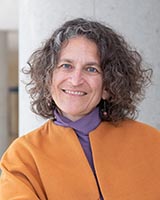
Katherine (Kate) Frohlich (Chair)
Scientific Director of the Institute of Population and Public Health, CIHR
Dr. Frohlich is Professor at the School of Public Health (ESPUM), as well as a research associate at the UdeM-affiliated Centre for Research in Public Health (CReSP) at the Université de Montréal. She co-holds the Myriagone McConnell-UdeM Chair on Youth Knowledge Mobilisation with colleagues from UdeM's Faculty of Arts and Science. Kate began her mandate as Scientific Director of the Institute of Population and Public Health at CIHR on September 1, 2023. Kate holds an Honours BA from McGill University in Political Science and Masters and PhD degrees in Public Health from the Université de Montréal.

Ritu Banerjee
Health Emergency Readiness Canada, Innovation, Science and Economic Development Canada
Ritu Banerjee is the Interim Head at Health Emergency Readiness Canada (HERC), formerly the Office of Life Sciences and Biomanufacturing Readiness (OLSBR) at Innovation, Science and Economic Development Canada. Prior to that she was the Executive Director of the Results Division, Expenditure Management Sector at the Treasury Board Secretariat. She has also worked at Employment and Social Development Canada on youth policy and has held various executive positions at Public Safety Canada, primarily working on national security policy issues. She started her career in the federal government at the Department of Justice.
In addition to a Bachelor of Arts degree from McGill University, she has a Master of Arts in Political Science from the School of Oriental and African Studies, University of London and a Law degree from the University of Ottawa. She has been a member of Ontario Bar since 2000.

Éric Bastien
Director of the Research Partnerships Portfolio, Social Sciences and Humanities Research Council
Mr. Bastien is the Director of the Research Partnerships Portfolio at the Social Sciences and Humanities Research Council (SSHRC) since 2018 and has been working for SSHRC for 25 years. Éric's main responsibilities have been the development and management of funding opportunities and joint initiatives that support partnerships between Canadian postsecondary institutions and organizations of our society, in Canada and abroad, in public, private and not-for-profit sectors.

Marisa Creatore
Ex-officio, Executive Director, CRPPHE
Dr. Marisa Creatore is CIHR's Executive Director of the Centre for Research on Pandemic Preparedness and Health Emergencies (CRPPHE). Marisa was previously the Associate Scientific Director of the CIHR Institute of Population and Public Health (CIHR-IPPH). Since joining CIHR-IPPH in 2016, she has helped develop and implement key initiatives including the Healthy Cities Initiative and the UN Research Roadmap for COVID-19 Recovery. She has also established key relationships with many federal, provincial, and international partners. Prior to CIHR, she was the inaugural Director of Research and Analytics at BlueDot, a company focused on pandemic preparedness and delivering insights to governments on global infectious disease outbreaks including the U.S. Centers for Disease Control and Prevention (CDC), the World Health Organization, and the Association of Southeast Asian Nations (ASEAN). Dr. Creatore has held various research-related positions at both the Institute for Clinical Evaluative Sciences (ICES) and at St. Michael's Hospital in Toronto. She is an epidemiologist by training with a Master's degree from Queen's University and a PhD from the University of Toronto, where she holds an Assistant Professor status appointment in Epidemiology at the Dalla Lana School of Public Health.

Masha Cemma
Chief Science Advisor Representative
Dr. Cemma is a Senior Policy Advisor in the Office of the Chief Science Advisor (OCSA) and is the lead on the emergency preparedness file. In this capacity, she co-organized the Canada-UK-US Science Advice in Emergencies simulation exercise and established the Chief Science Advisor COVID-19 Expert Panel. Her other contributions include the development of the Roadmap for Open Science, organizing the Open Science Dialogues and planning the inaugural Science Meets Parliament program. Prior to joining the OCSA, Dr. Cemma supported a newly-established international network of high-containment laboratories, BSL4ZNet. In that role, she worked with partners to foster international cooperation, knowledge translation and exchange among high-containment laboratories with the goal of strengthening preparedness for high-consequence pathogens.
Dr. Cemma holds a Ph.D. in microbiology from the University of Toronto. She has also been recognized as an Emerging Leader in Biosecurity Initiative fellow by Johns Hopkins Centre for Health Security and an Action Canada fellow by the Public Policy Forum.
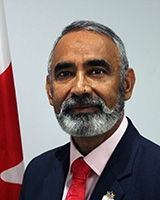
Jagvinder Dhanda
Canadian Food Inspection Agency
Dr. Dhanda's career spans over 30 years across academic, private, and public sectors in India, Australia, and Canada. After earning his Master's and DVM degrees in 1987, he began his career in animal health at a sheep breeding farm in India. He then spent six years as a research scientist at a university in northern India before being awarded a fellowship by the Australian Agency for International Development in 1996. This opportunity allowed him to pursue a PhD in Animal Production at the University of Queensland, Australia.
In 2000, he reached another milestone when he accepted a research position at the University of Saskatchewan and relocated to Canada. In 2005 Jag joined the public sector when he accepted a regulatory veterinarian position with the Canadian Food Inspection Agency (CFIA). Over the past 20 years, Dr. Dhanda has played a pivotal role in animal health and food safety programs at CFIA. He now serves as the Executive Director of the Animal Health Science Directorate, where he leads efforts in risk assessment, risk intelligence, surveillance design, research coordination, and laboratory operations. His work leverages cutting-edge scientific expertise and technologies to prevent, detect, control, and report foreign animal diseases, zoonotic infections, and emerging threats.
In addition to his CFIA responsibilities, Jag co-chairs the Biosafety Level 4 Zoonotic Laboratory Network (BSL4ZNet), alongside a U.S. counterpart, with partners from Australia, Germany, and the United Kingdom. This international network brings together high containment animal and public health organizations to address high-consequence pathogens through a One Health approach. Scientific diplomacy is at the heart of BSL4ZNet, fostering collaborations during peacetime to strengthen preparedness and leverage global expertise during outbreaks and emergencies.

Chelsea Gabel
Scientific Director, Institute of Indigenous People's Health
Dr. Gabel is Red River Métis originally from Rivers, Manitoba and a citizen of the Manitoba Métis Federation (MMF). She is an Associate Professor in the Indigenous Studies Department and the Department of Health, Aging and Society at McMaster University. Dr. Gabel holds a Canada Research Chair in Indigenous Well-Being, Community Engagement, and Innovation. She is the former lead of the Indigenous Mentorship Network of Ontario and former co-lead of the Network Environments for Indigenous Health Research (NEIHR) National Coordinating Centre which acts as a secretariat, supporting the nine funded NEIHRs across Canada. Dr. Gabel's current research focuses on identity politics, Indigenous policy, community-engaged research, Métis health and well-being, data governance, arts-based research, ethics, digital technology and the importance of intergenerational relationships.
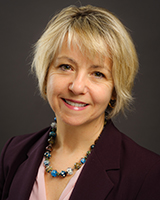
Bonnie Henry
Provincial Health Officer
Dr. Bonnie Henry was appointed as British Columbia's Provincial Health Officer in 2018. As BC's most senior public health official, Dr. Henry is responsible for monitoring the health of all British Columbians and undertaking measures for disease prevention and control and health protection. Most recently Dr. Henry has led the province's response on the COVID-19 pandemic and drug overdose emergency.

Melissa Hisko
Global Affairs Canada
Mellissa Hisko is the Director of Infectious Diseases and Global Immunization at Global Affairs Canada, where she is responsible for advancing Canada's international infectious disease policy and programming efforts, managing Canada's international outbreak response, and advancing pandemic prevention, preparedness, and response globally. Prior to assuming her current functions in 2023, she served as the Director of the COVID-19 Global Health Task Force. Since 2010, Ms. Hisko has held various management roles in international assistance and multilateral cooperation at Global Affairs Canada, including as an advisor to the Deputy Minister of International Development. She has represented Canada on the Board of several global health partnerships, including Gavi, the Vaccine Alliance, Nutrition International, and Scaling-Up Nutrition (SUN) Movement Senior Officials Group.
Ms. Hisko holds a Bachelor of Arts from Carleton University and a Juris Doctor from the University of Ottawa.
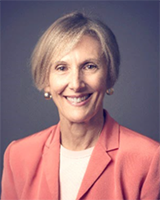
Bev Holmes
National Alliance of Provincial Health Research Funders (NAPHRO) Representative
Dr. Bev Holmes is the President & CEO of the Michael Smith Health Research BC. She is a health research system leader with expertise and experience in and passion for the funding, production and use of research evidence to improve health. She sits on research advisory groups across Canada and internationally, is an associate editor at Implementation Science Communications and participates in the National Alliance of Provincial Health Research Organizations.
An adjunct professor at SFU's Faculty of Health Sciences and UBC's School of Population and Public Health, she is also a Chartered Director (Degroote School of Business, McMaster University). She has held several management positions in non-profit agencies.
Dr. Holmes received her MA and PhD from SFU's School of Communication. She and partner have four children and one grandchild; they gratefully make their homes on the traditional, unceded territory of the Coast Salish peoples, including the territories of the xʷməθkwəy̓əm (Musqueam), Səl̓ílwətaʔ/Selilwitulh (Tsleil-Waututh) and Skwxwú7mesh (Squamish) First Nations.
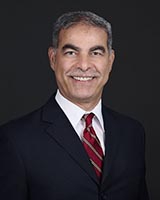
Montasser Kamal
International Development Research Centre (IDRC)
Dr. Kamal is the Director of Global Health at IDRC. He re-joined IDRC in 2016, having previously worked at the Centre from 2000-2. He has more than 35 years of experience in international development, including in the civil society, government and philanthropic sectors. He led IDRC's Innovating for Maternal and Child Health in Africa (IMCHA) initiative and the Centre's Health Research Partnerships. Montasser was formerly the deputy director for Global Health Policy and Research at Global Affairs Canada. He also worked at the former Canadian International Development Agency, as team leader of Health Specialists, and he also served as a reproductive health policy advisor and manager of Multilateral Health Institutions and Partnerships. Between 2007-14, at the Middle East and North Africa Regional Office of the Ford Foundation, he supported research, policy advocacy and programming related to sexual and reproductive health and rights, as well as HIV/AIDS.
He is an MD with Diploma and holds MSc and PhD degrees in medicine, international development and medical anthropology from Egypt, the United Kingdom and Canada.

Charu Kaushic
Scientific Director, Institute of Infection and Immunity
Steering Committee Equity Champion
Dr. Kaushic has 23 years of experience working in infectious diseases and immunity. As a trained immunologist who has worked on understanding and developing vaccines against viral and bacterial infections, her background and expertise have been very useful for CIHR during COVID-19. She has represented CIHR for both subject matter expertise and strategic linkage in the Immunity Task Force and the HC DM's Variants of Concern Leadership Group. She has been invited frequently to participate in Chief Science Advisor's Experts Consultations, made presentations to the Vaccine Task Force, COVID-19 Forum, and other key decision- making tables. She has provided briefings and updates to the CIHR President and Science Council and has been invited to provide insights and information on COVID-19 in special all- staff meetings multiple times in last 2.5 years.
Dr. Kaushic has led CIHR's participation in Pandemic Preparedness and Response internationally since 2018, first in her role as Co-Chair of GloPID-R, and since Oct 2020 as the Chair. In this role, she engaged in strategic discussions internationally with partners from 32 countries and 7 observers including WHO, CEPI, European Commission, Wellcome Trust among many. The mandate of GloPID-R is to coordinate pandemic preparedness and response among funders. As Chair of this meta-organization, she has a unique insight into the global activities and coordination in pandemic space. During the past 2.5 years, GloPID-R has played a key role in coordinating research response. More recently, GloPID-R is working closely with G7 and WHO on Clinical Trial Charter Implementation, building a pandemic tracker and regional hubs to increase capacity in LMIC. A lesson learned from COVID-19 pandemic is that global coordination is absolutely required to do better in future emergencies, regional outbreaks, and global pandemics.

Lakshmi Krishnan
National Research Council
Dr. Lakshmi Krishnan was appointed as the Vice President of Life Sciences as of April 1, 2022. In this capacity, she oversees the Human Health Therapeutics, Aquatic and Crop Resource Development and Medical Devices CRPPHEs.
As a globally recognized Life Sciences researcher, Dr. Krishnan has been a leader for driving innovation in vaccine technologies and novel biologics for the improvement of human health. Over the course of her career, she has represented NRC and government of Canada at various national and international joint committees and has been invited as guest speaker on many occasions. In her current role, she is committed to health innovation and sustainable bio-economy.
Dr. Krishnan joined the NRC in 1997 and, as a scientist, built expertise in immunology research at the Institute for Biological Sciences (IBS), in the areas of vaccine adjuvants and host pathogen interactions. Prior to her current appointment, she was the Director General (DG) of the Human Health Therapeutics (HHT) CRPPHE (2018–2022), Program Lead for Vaccines and Immunotherapy (2015–2018), Director of R&D for Immunobiology at HHT (2016–2018), and a research officer (1997–2014) at IBS and HHT. Over the course of her career, Dr. Krishnan has been the recipient of numerous competitive research grants from various agencies including the Ontario Institute for Cancer Research (OICR), CIHR, and the National Institutes of Health (NIH – USA). She has published over 75 primary research articles in peer-reviewed journals in the field of vaccine technologies, host-pathogen and cancer immunity, and is listed as an inventor on several patents. She has significant experience in technology transfer to industrial clients and at the same time has a strong academic background, having mentored several graduate students who have all gone on to have successful research careers. She is member of the board of the Canadian Cancer Research Alliance, National Synthetic Biology Steering Committee and has also chaired the Federal Vaccine Research Innovation and Development DG committee, which consists of membership from 13 different federal departments across the Government of Canada.

Sarah Lawley
Assistant Deputy Minister Health Policy Health Canada (HC)
In her current role as Assistant Deputy Minister (ADM) of the Health Policy Branch for Health Canada, Sarah Lawley provides expert level advice on complex health policy issues. She leads the development of effective health policies and strategies through consultation and engagement, and is responsible for addressing priority, emerging, and cross-cutting issues that impact the health of Canadians.
In her previous role as the ADM, Communications and Public Affairs Branch (2021-2025), she led innovative, evidence-based communications on complex health and public health issues, led risk and crisis communications responses to emerging issues, and delivered targeted health promotion initiatives, leveraging expertise in strategic communication, public education, marketing, advertising and partnerships and digital media to support improved health outcomes for everyone in Canada.
As the ADM, Consultations & Communications at Finance Canada (2019-2021) Ms. Lawley led cross-country Pre-Budget Consultations and was responsible for the delivery of the annual federal Budget and Economic Update. In response to the COVID-19 pandemic, she led the public communications in support of the Economic Response Plan – the most significant undertaking in the history of the Department of Finance.
She has previously held executive level positions in both international affairs and communications functions within the federal government. In 2018, she was included in the inaugural list of Canadian Women in Global Health for her work representing Canada on the global stage, including on issues of mental health.
Ms. Lawley holds a B.A. with Highest Honours in Journalism from Carleton University.

Jeffery Nerenberg
Natural Sciences and Engineering Research Council (NSERC)
Mr. Nerenberg is the Director of Manufacturing, Communications, and Technologies at the Natural Sciences and Engineering Research Council (NSERC). Jeffery co-leads NSERC's flagship partnership program, Alliance, which supports Canada's university researchers working in close partnership with organizations from the private, public, and not-for-profit sectors. Jeffery's past experience with NSERC has included leading NSERC's national network of Regional Offices, the development and implementation of Automotive Partnership Canada, as well as delivering a range of other partnership programs. Prior to joining NSERC in 2003, Jeffery spent several years in the R&D department of a company specializing in personal protective equipment for landmine and explosive disposal. He started his career as a production engineer within the steel industry. Jeffery holds a master's degree in mechanical engineering from McGill University and is a licensed Professional Engineer.
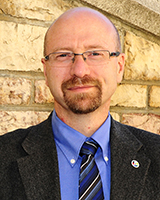
Cory Neudorf
Urban Public Health Network
Dr. Neudorf is the Interim Senior Medical Health Officer with the Saskatchewan Health Authority, and Professor in the Department of Community Health and Epidemiology, College of Medicine, University of Saskatchewan. He received his medical degree from the University of Saskatchewan, a Master of Health Science degree (Community Health and Epidemiology) from University of Toronto, and is a Fellow of the Royal College of Physicians and Surgeons of Canada with Certification in the specialty of Public Health & Preventive Medicine. He has held various leadership roles in Public Health at the national level in Canada, including:
- Chair of the Canadian Population Health Initiative Council
- President of the Canadian Public Health Association
- President of the Public Health Physicians of Canada
In 2020, he was awarded the R.D. Defries medal by the Canadian Public Health Association for outstanding contributions in the broad field of public health. He is currently serving on the editorial board of the Canadian Journal of Public Health and the Strategic Analytic Advisory Committee of the Canadian Institutes for Health Information. He is President of the Urban Public Health Network of Canada and is a liaison member with the Regions for Health Network (WHO Europe).
His research interests include: intervention research to improve health equity; public health systems and services research; health status indicators and surveys; and integrating population health into health system performance improvement and strategic planning.
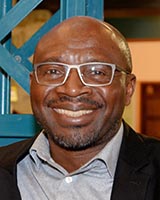
Charles Nfon
Laboratory Network Director, National Centres for Animal Disease (CFIA)
Dr. Charles Nfon is the Laboratory Network Director for the Canadian Food Inspection Agency's National Centres for Animal Disease (NCAD/CFIA), with laboratories in Winnipeg, Manitoba and Lethbridge, Alberta. He oversees the management of containment level 2 – 4 laboratories responsible for research and development as well as diagnostics for foreign animal diseases and production-limiting endemic diseases.
Prior to this, Dr. Nfon was a research scientist and head of the Vesicular Diseases Unit (VDU) at the National Centre for Foreign Animal Disease. As head of VDU he led and managed research and diagnosis of foot-and-mouth disease (FMD) and its differentials. He is the designated expert for the World Organization for Animal Health (WOAH) and the Food and Agricultural Organization of the United Nations (FAO) Reference Laboratory for foot-and-mouth disease. Dr. Nfon was also acting director for NCFAD in December 2019 to January 2020.
Dr. Nfon obtained his PhD from the Liverpool School of Tropical Medicine, University of Liverpool, England in 2004 and then completed postdoctoral fellowships at the Plum Island Animal Disease Center (PIADC), USDA, New York, and the University of Manitoba. He joined the NCFAD in 2009 during the pandemic H1N1 influenza outbreak and was in charge of characterizing swine influenza viruses circulating in pigs in Canada. He subsequently worked on teams that developed and tested vaccines for avian influenza (H5N1, H5N2 and H7N9), Rift Valley fever virus (RVFV) and capripox virus. He also participated in studies of Ebola virus in pigs and traveled to Guinea in 2015 to assist in Ebola virus diagnostics in the Public Health Agency of Canadian mobile diagnostic laboratory. Dr. Nfon is also an adjunct professor in the Animal Science Department, University of Manitoba.

Jasmine Pawa
Rural/ Remote Medical Officer of Health
Dr. Jasmine Pawa is a Public Health and Preventive Medicine specialist physician. She works as a public health physician consultant to a range of public sector organizations and is the President of the national specialty society, Public Health Physicians of Canada.
She also supports the health care and operations teams in Nunavut as a Senior Medical Advisor within the Department of Health, with a focus on preventive care and population health. Prior to this, she provided coverage for the Deputy Chief Public Health Officer (DCPHO) role for the territory, including increased support during the COVID-19 pandemic.
She completed medical school at the University of Alberta before moving to Toronto for the public health residency training. She holds a master's degree in health policy obtained in the UK jointly from LSHTM and LSE. She has academic appointments with NOSM University and the University of Toronto which involve research as well as teaching medical students and residents.
Her professional focus is on health policy and health systems, particularly at the intersection of health care and public health, and she has additional experience in qualitative methods. She's committed to working with teams on integrating population health and medical expertise with the insights of community members—and shifting decision- making accordingly.

Supriya Sharma
Health Canada Chief Medical Advisor (HC)
Dr. Supriya Sharma became Health Canada's Chief Medical Advisor in August 2015. She added these responsibilities to those in the role of Senior Medical Advisor in the Health Products and Food Branch, a role she has had since March 2013. The Health Products and Food Branch has the responsibility to regulate pharmaceuticals, medical devices, biologics, vaccines, natural health products, veterinary medicines and food. Prior to that, Dr. Sharma has held a number of positions in Health Canada over the past decade in both the pre-market and post-market health product regulatory areas including most recently Director General of the Therapeutic Products Directorate, which had the regulatory responsibility for pharmaceuticals (prescription and non-prescription) and medical devices. She has also worked as a Senior Policy Advisor as part of the National Pharmaceuticals Strategy in Health Canada. Recently, she has returned to Health Canada following a leave of absence to work in an academic research group focusing on health innovation adoption in the Canadian Health system.
Trained as a pediatrician in both Canada and Australia, Dr. Sharma was a research fellow in hematology focused on clinical research relating to thalassemia and sickle cell disease and has worked on a number of large multi-center clinical studies, including research in collaboration with Oxford University on a project in Sri Lanka. She then went on to complete a Masters of Public Health at the Harvard School of Public Health with a concentration in International Health and an interest in Health Policy.

Matthew Tunis
National Advisory Committee on Immunization (NACI)
Dr. Matthew Tunis is the Executive Secretary to the National Advisory Committee on Immunization (NACI), where he oversees the workplan and scientific activities of the committee in his position at the Public Health Agency of Canada. He holds a PhD in Microbiology and Immunology from Dalhousie University, and is an adjunct professor at the University of Ottawa School of Epidemiology and Public Health. Matthew trained and worked as a paramedic in Nova Scotia prior to joining the Public Health Agency of Canada.

Sarah Viehbeck
Public Health Agency of Canada (PHAC)
Reporting to the President, Dr. Sarah Viehbeck is the Chief Science Officer for the Public Health Agency of Canada (PHAC). In this role, she is responsible for providing strategic leadership to oversee and support science excellence, science-policy integration and science promotion, as well as re-energizing the scientific vision and capacity toward “Strengthening the Voice of Science” across the Agency.
Prior to this, she was the Associate Vice-President Research - Evidence Integration at CIHR. In this role, Dr. Viehbeck was responsible for all science-related strategy and policy development. There, she led the design of a comprehensive suite of programs and initiatives to support CIHR's mandate, with a priority focus on equity, diversity and inclusion as well as growing and maintaining a strong and sustainable Canadian health research workforce. She also played a key leadership role in the Agency's COVID-19 response.
Dr. Viehbeck is a former adjunct faculty member at University of Waterloo's School of Public Health and Health Systems and the University of Ottawa's Interdisciplinary School of Health Sciences and former Board member of the National Collaborating Centre for Determinants of Health.
She has been recognized for her contributions by the Senior Women Academic Administrators of Canada, the Ontario Tobacco Research Unit, the Canadian Public Health Association, and through a CIHR President's Award of Excellence.

Jennifer Unger
Emergency Management and Programs Branch, Public Safety Canada
Jennifer Unger is Director of the National Search and Rescue Secretariat and Emergency Management Transformation Division. She draws upon her more than 15 years of service at Public Safety Canada in the emergency management (EM) discipline including in regional operations, EM training, strategic planning and transformation, policy development and stakeholder engagement. In this capacity, Ms. Unger has been proud to have served Canadians through her leadership on notable initiatives which include: Supporting Canada's Public Safety Personnel: An Action Plan on Post-Traumatic Stress Injuries; the Government of Canada's $170 million program Supporting the Canadian Red Cross's Urgent Relief Efforts Related to COVID-19, Floods and Wildfires; Canada Strong - Supporting the Families of the Victims of the Flight PS752; and Supporting Air Rescue: National Investment to Support Shock Trauma Air Rescue Services in Western Canada.
A seasoned manager with 25 years' experience in the federal public service, she has also served with Immigration, Refugees and Citizenship Canada (IRCC) and with Innovation, Science and Economic Development Canada (ISED). Her work experience has also extended outside the federal public service, where she worked six years at Colleges and Institutes Canada on international bilateral and multilateral skills development projects.
Ms. Unger is the recipient of the Queen Elizabeth II Diamond Jubilee Medal and four Deputy Minister Awards for her service to Canadians. She holds a Bachelor of Commerce degree from Memorial University of Newfoundland.
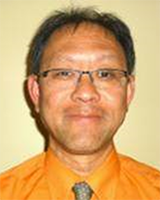
Tom Wong
Indigenous Services Canada
Dr. Thomas Wong, MD, MPH, CCFP, FRCPC is the Director General for the Office of Population and Public Health. He is also the Chief Medical Officer of Public Health and the Chief Science Officer at the First Nations and Inuit Health Branch of Indigenous Services Canada. He is trained in family medicine, internal medicine, infectious diseases and public health at McGill, Harvard, and Columbia. His public health work includes engagement with Indigenous communities, HIV, hepatitis C, sexually transmitted infections, tuberculosis, influenza, vaccine preventable diseases, antimicrobial resistance, chronic diseases, mental health, addiction, and health disparities. Dr. Wong sits on multiple national and international committees and has academic appointments at both the University of Ottawa and the University of Toronto.
- Date modified: